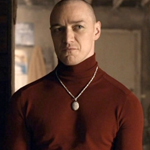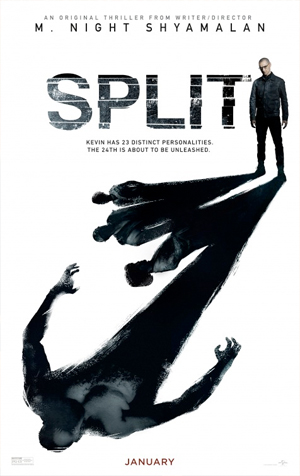 Request: please be extra careful in the comments not to give away that one surprise thing where people might see it by accident.
Request: please be extra careful in the comments not to give away that one surprise thing where people might see it by accident.SPLIT is M. Night Shyamalan’s odd little thriller about three teenage girls abducted from a parking lot and kept locked in a room by a man calling himself Dennis (James McAvoy). Terror turns to confusion when he starts coming to the room talking different, acting different, claiming to be different people. It turns out Dennis is just one of 23 personalities in this guy, and they don’t all necessarily support what he’s doing.
Logically you assume this kidnapper is gonna be a rapist or killer, and these may be true, but for now he’s being told to cool it by “Patricia,” a female personality who shows up occasionally to make the girls mayo sandwiches and assure them “he’s not supposed to touch you.” Oh, okay, that’s comforting. He also shows up as “Hedwig,” an 11 year old boy who likes to dance and listen to Kanye West and giggles a little when he warns them that “The Beast” is coming.
I haven’t always been on board for McAvoy (WANTED, VICTOR FRANKENSTEIN, X-MEN FIRST CLASS), who’s obviously a good actor but seems weirdly prone to playing heroes who are a little too douchey to completely root for. But here he’s truly great. Each character has a different voice, accent and body language – you can recognize them even before he speaks, even if he doesn’t change his clothes. (Though he usually does. He seems to be very fast at it.) McAvoy is clearly having alot of fun with this, taking his acting skills and doing a bunch of donuts and wheelies and shit. Going off jumps.
The central gimmick of the movie, explained by therapist Dr. Karen Fletcher (Betty Buckley, the gym teacher from CARRIE – great to see her as a co-lead in this!), is a theory that different personalities can have different body chemistry. She talks of cases where people are blind or diabetic only with one of their personalities and not the rest of the time. Since she really believes in these mind-powered bodily transformations she’s a little nervous about Kevin (that’s the guy’s real name) believing in this “Beast.” What’s he gonna do? Is he gonna grow hairy or something? This could get weird.
 There’s definitely a big PSYCHO influence, obviously with the subject matter and the movie’s tendency to focus on the killer, though his not-evil personalities seem to be a little more complicit than Norman Bates is with his imagined mother. Hitchcock’s shadow also hangs over the music, the opening titles, Shyamalan’s traditional director cameo, and the doctor’s role as deliverer of exposition. But she’s more like Buckley’s character from CARRIE: a very caring person who sees trouble coming and tries to help, but might be in over her head.
There’s definitely a big PSYCHO influence, obviously with the subject matter and the movie’s tendency to focus on the killer, though his not-evil personalities seem to be a little more complicit than Norman Bates is with his imagined mother. Hitchcock’s shadow also hangs over the music, the opening titles, Shyamalan’s traditional director cameo, and the doctor’s role as deliverer of exposition. But she’s more like Buckley’s character from CARRIE: a very caring person who sees trouble coming and tries to help, but might be in over her head.
She’s familiar with his 23 personalities, but hasn’t met all of them. She thinks they’re up to something, and sometimes impersonating each other. One of them named Barry seems to keep emailing her for help, and then the others take over and tell her everything’s fine. She tries to tread lightly, politely, and get the truth out of them.
Shyamalan has had a questionable comedy streak since at least LADY IN THE WATER, and here he occasionally tries out some overwritten witty repartee, which is not entirely successful. But I think he does give the three young captives quirks that defy our expectations. Casey (Anya-Taylor Joy from THE WITCH) is sort of the lead, because she’s the school outcast with the troubled (to say the least) background that connects her to the villain. But the other two popular girls, Claire (Haley Lu Richardson, THE EDGE OF SEVENTEEN) and Marcia (Jessica Sula), who don’t particularly like Casey at first, are not Mean Girls. Claire inviting non-friend Casey to her birthday party out of pity shows that she has some kind of kindness in her, and she makes jokes, comes up with ideas and gives inspirational talks that make her cool and invaluable in this situation. Marcia is more of a follower and secondary character, but never a jerk.
Obviously we first knew of Shyamalan from THE SIXTH SENSE, so we’ve always know him to be good with young actors. I think this continues what he was doing with THE VISIT, having young characters who are smart and don’t really fit into the standard categories.
Many will be offended by the movie’s fantastical extrapolation of a real mental disorder, and that’s fair. But there’s another weird theme that I’m interested to hear people’s thoughts on. We find out over time that Casey, like Kevin, is a survivor of childhood sexual abuse. In fact she doesn’t seem to have escaped it yet. It’s pretty fucked up for a PG-13 movie, actually, because the not at all graphic flashback showing the bizarre way that an initially likable character lured a child in for molestation is way more disturbing than if it had been done in a more normal way. I’m sorry to say that there have been a few times in my life when people I knew were convicted of sex crimes, and this reminds me of making the mistake of reading about what they did. Sometimes it’s best not to know the strange details of a sick mind.
But obviously that scene is supposed to upset you, so it’s doing its job. The more questionable part has to do with Dennis’s villainous philosophy that people who have been victimized like he was are “pure” and given some sort of power by the experience. In his case, the psychological damage has literally given him a superhuman ability. I’m sure that Shyamalan means this to be an empowering story for abuse survivors, and Casey balances things out because her experience has not made her crazy or evil. Still, I wonder how I would feel about it if I had been through something like that. I might not be happy with ascribing anything positive to such atrocities. Or maybe I really would think it was a way of saying you can’t hurt me, you will only make me stronger? I don’t know.
But I have the luxury of overlooking that, and for the most part this is an effective and at times genuinely scary suspense thriller. I like a precise filmmaker like Shyamalan doing these sorts of mechanics: the careful attempt to trick and manipulate the different personalities, to find the window and the method to run for the door or the weapon or the walkie talkie.


























February 6th, 2017 at 12:21 pm
It’s worth discussing Shyamalan’s cameo, which plays like a mea culpa for his role in Lady in the Water. Literally every other line of dialog aimed at his character underlined what a loser he is. It really felt like “I’M SORRY YOU GUYS PLEASE LIKE ME AGAIN.” It was rather charming, in a way.
Speaking as someone with a mental illness, albeit not one anywhere near as serious as what Kevin has in this movie thank God, I had a very different reaction from what Vern is supecting. I’m really tired of the subtle, self-congatulatory back-patting that lurks underneath most stories about outcasts and “freaks” and the mentally ill. It’s like all the nerds and unhappy teenagers who got pushed around as kids grew up, got control of the arts, and have spent decades telling stories about how the pain and suffering they’ve experienced really proves how awesome they secretly are. Well, as someone who grew up feeling that way and still suffers the effects: it’s NOT awesome. It sucks. Life is so much less than it could be without this kind of suffering.
It feels insulting being coddled the way our culture often does, eg sensitive labels such as “differently abled” and the like. SPLIT, to me, felt like Shyamalan viciously and even venomously striking out at the subtext of our modern superhero movie culture, that your suffering and pain make you awesome and that you are actually better off for being alone and an outcast honest for real it’s the happy healthy people you should feel sorry for.
No. The second you put the standard issue X-Men style speach in the mouth of a villain, it’s obvious how psychotic it is.
I enjoy a superhero movie as much as anyone, but looking at what they represent I can’t help but feel that we as a culture have lost our damn minds. SPLIT is one of the only movies out there honest enough to call a spade a spade. I loved it.